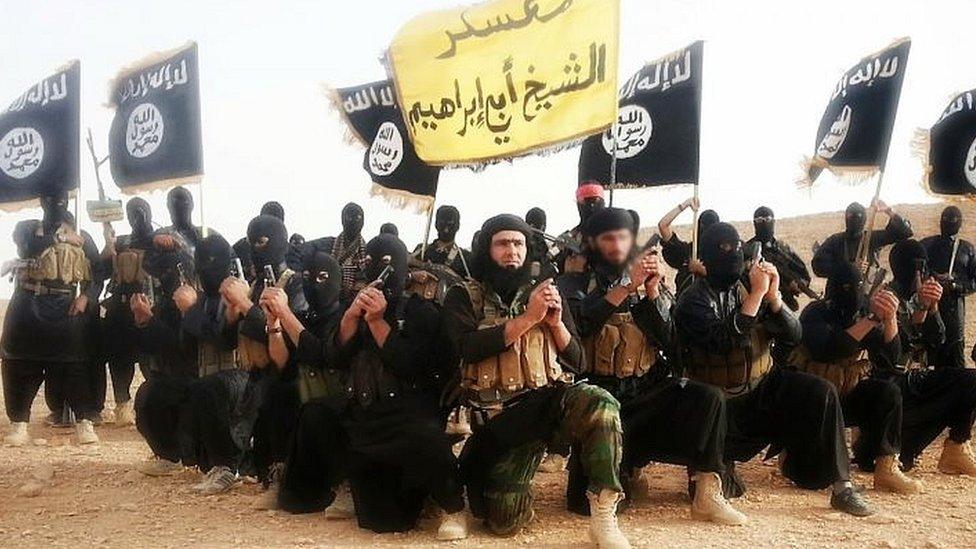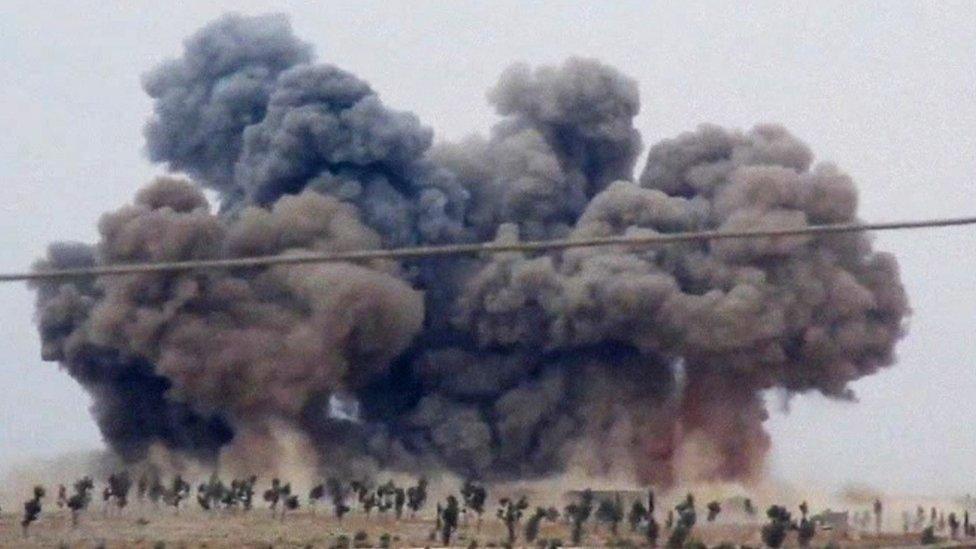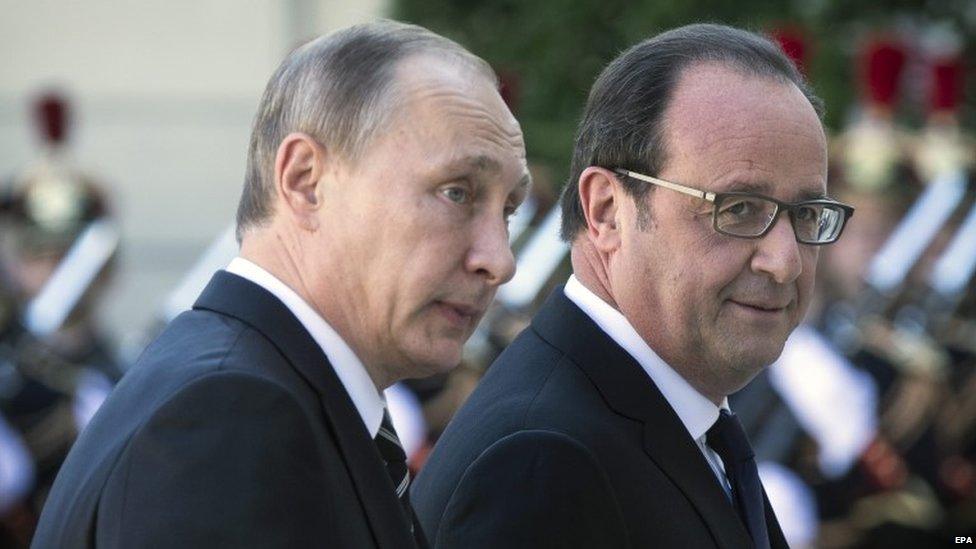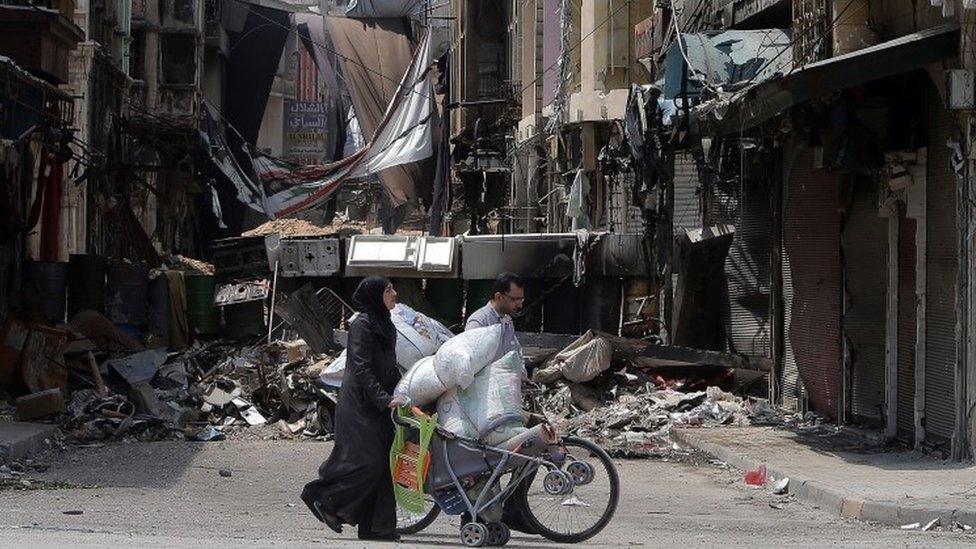Syria conflict: Russia strikes 'will fuel extremism'
- Published
The BBC has obtained exclusive footage of the aftermath of a Russian air strike in Syria
Members of the US-led coalition against Islamic State have called on Russia to cease air strikes they say are hitting the Syrian opposition and civilians.
In a statement, external, the US, UK, Turkey and other coalition members said they would "only fuel more extremism".
Russia, which according to witnesses launched fresh strikes on Friday, says it is targeting Islamic State (IS).
Meanwhile, reports say IS fighters have attacked a government airbase in eastern Syria.
Reports from the area, near the IS-controlled city of Deir al-Zour, speak of loud explosions, heavy clashes and government fighter jets circling in the sky.
A senior Russian official says the air strikes could last for three to four months.
Alexei Pushkov, the head of the foreign affairs committee in Russia's parliament, added that the US had only "pretended" to bomb IS and promised that Russia's campaign would be much more effective.

Russian air strikes - in depth
What hardware does Russia have?
Where key countries stand - Who is backing whom
Why? What? How? - Five things you need to know about Russia's involvement
What can Russia's air force do? - The US-led coalition has failed to destroy IS. Can Russia do any better?
Media offensive - What does the campaign look like through the lens of Russian media?
Inside an air strike - Activist describes "frightening Russian air strike"

The Russian air force began air strikes in Syria on Wednesday.
The Syrian military said Russia had carried out a total of 18 air strikes since Thursday evening. It said several of these were in Aleppo, Hama and Idlib, provinces with little IS presence.
Communications towers belonging to the Free Syrian Army - forces opposed to President Assad which have received American training and supplies - were destroyed in a Russian air strike in Aleppo.
The Russian defence ministry said it had attacked the IS stronghold of Raqqa on Thursday.
The British-based Syrian Observatory for Human Rights said a training camp and a camouflaged command post near Raqaa were hit, and 12 IS fighters were killed.
Some of those who have fled Syria are sceptical about Russia's military intervention
The strikes in Syria are Russia's first military engagement outside the borders of the former Soviet Union since the end of the Cold War.
The warning from members of the US-led coalition came as the French and Russian presidents met in Paris. The meeting was called to discuss peace efforts in Ukraine, but these are expected to be overshadowed by Syria.
The Syrian opposition and others have suggested non-IS rebel factions opposed to Syrian President Bashar al-Assad - the Kremlin's ally - are bearing the brunt of the Russian attacks.

French President Francois Hollande, using an derogatory Arabic acronym for IS, said it was important that "the strikes, regardless of who is carrying them out, target Daesh and not other groups".
Russian Foreign Minister Sergei Lavrov, speaking at the UN in New York, said Russia would also fight other terrorist groups including the al-Nusra Front - an al-Qaeda affiliate.
He said this position was the same as that of the US-led coalition, which has been carrying out air strikes in Iraq and Syria for the past year.
"We are not supporting anyone against their own people. We fight terrorism," he said.
Mr Lavrov said the targets were selected "in co-ordination with the Syrian army".

Analysis: Frank Gardner, BBC security correspondent

"IS is likely to use Russian attacks as a rallying cry to jihadists"
The entry of Russia into the Syrian conflict, albeit in the air not on the ground, will be a perfect recruiting sergeant for IS.
The propaganda videos are doubtless already being prepared. The Russians are, after all, the same historic enemy fought by the Mujahideen in Afghanistan throughout the 1980s and eventually defeated (with US, Saudi and Pakistani help).
The prospect of Russian pilots attacking Muslim fighters on the ground will be embarrassing to Arab governments who will not want their air forces to be seen as on the same side.
The result is likely to be more recruits joining the extremists of IS and al-Nusra, both from within Syria and from outside the region.


Russian air strikes are said to have hit Homs, Hama and Idlib provinces on Thursday

Russian President Vladimir Putin met French President Francois Hollande in Paris
The joint coalition statement alleged that the strikes had caused civilian casualties but Russia says its warplanes have avoided civilian areas.
Rights groups have also accused the US-led coalition against IS of causing dozens of civilian deaths in air strikes.

Syria's civil war

Why is there a war in Syria?
Anti-government protests developed into a civil war that four years on has ground to a stalemate, with the Assad government, Islamic State, an array of Syrian rebels and Kurdish fighters all holding territory.
Who is fighting whom?
Government forces concentrated in Damascus and the centre and west of Syria are fighting the jihadists of Islamic State and Jabhat al-Nusra, as well as less numerous so-called "moderate" rebel groups, who are strongest in the north and east. These groups are also battling each other.
What's the human cost?
More than 250,000 Syrians have been killed and a million injured. Some 11 million others have been forced from their homes, of whom four million have fled abroad - including growing numbers who are making the dangerous journey to Europe.
How has the world reacted?
Iran, Russia and Lebanon's Hezbollah movement are propping up the Alawite-led Assad government, while Turkey, Saudi Arabia and Qatar back the more moderate Sunni-dominated opposition, along with the US, UK and France. Hezbollah and Iran are believed to have troops and officers on the ground, while a Western-led coalition and Russia are carrying out air strikes.
